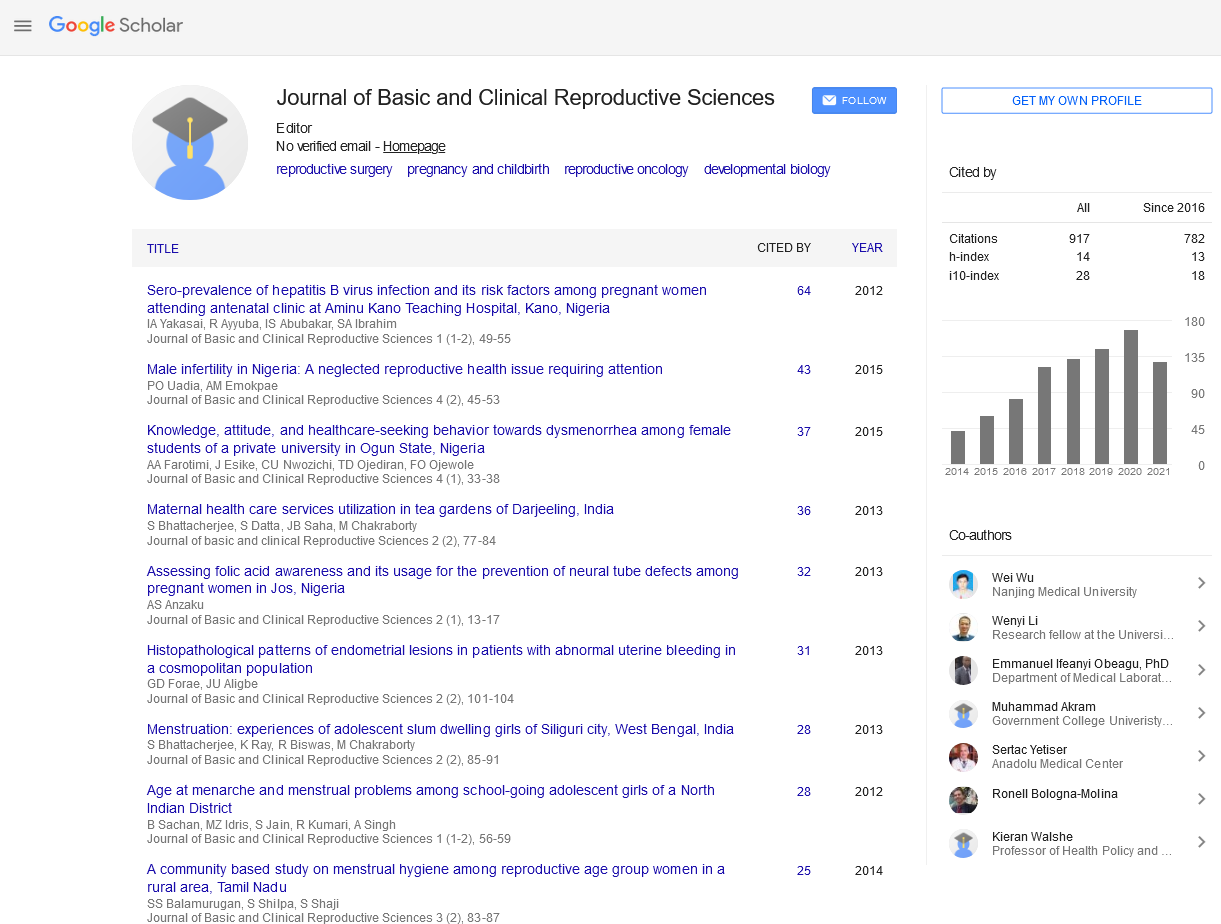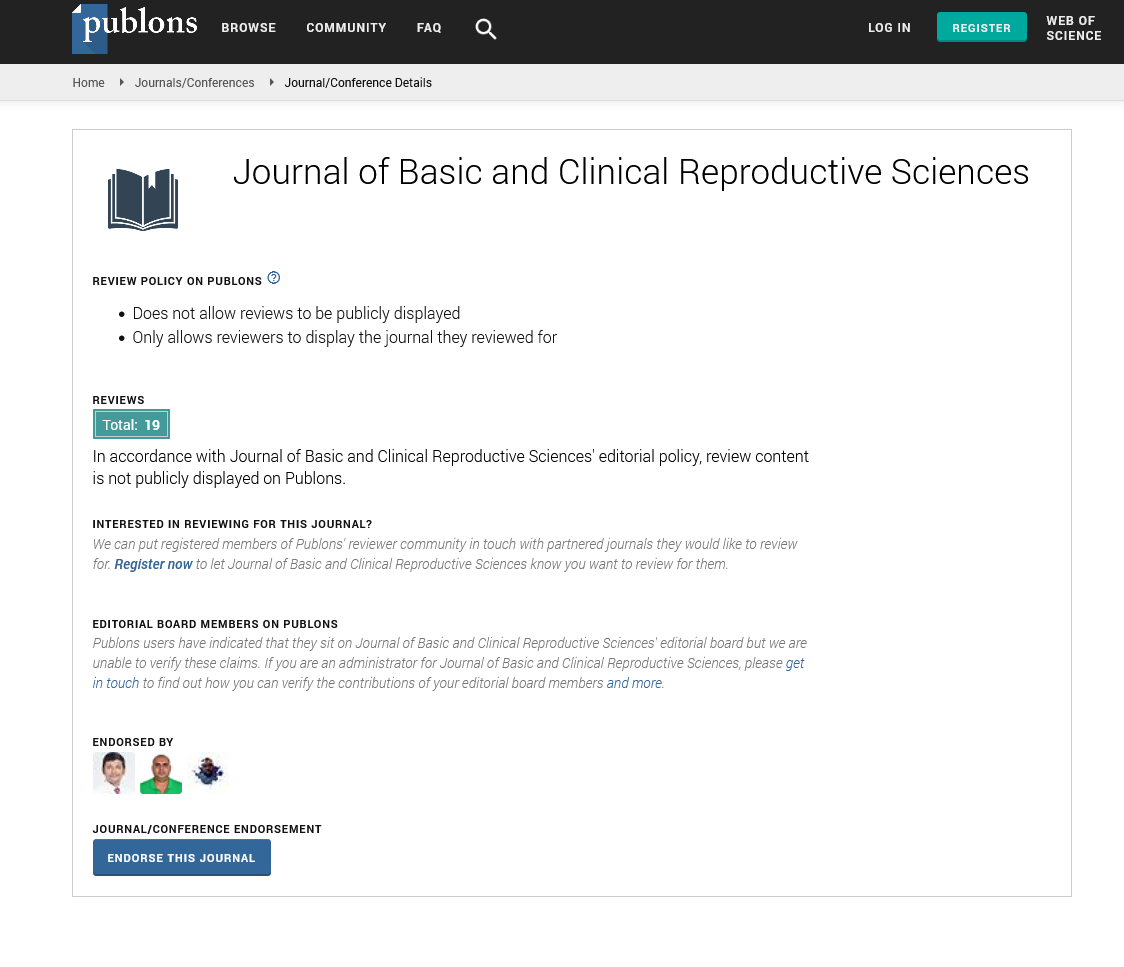Editorial - Journal of Basic and Clinical Reproductive Sciences (2021) Volume 10, Issue 5
(IVF)In Vitro Fertilization an Embryo
Received: 10-May-2021 Accepted Date: May 24, 2021 ; Published: 31-May-2021
This open-access article is distributed under the terms of the Creative Commons Attribution Non-Commercial License (CC BY-NC) (http://creativecommons.org/licenses/by-nc/4.0/), which permits reuse, distribution and reproduction of the article, provided that the original work is properly cited and the reuse is restricted to noncommercial purposes. For commercial reuse, contact reprints@pulsus.com
Introduction
in vitro fertilization (IVF) is a form of assistive reproductive generation (artwork). It entails retrieving eggs from a female’s ovaries and fertilizing them with sperm. This fertilized egg is called an embryo. The embryo can then be frozen for storage or transferred to a woman’s uterus. Your doctor also can implant embryos in a surrogate, or gestational provider. that is a woman who contains your child for you. The success fee of IVF varies. in line with the yank pregnancy affiliation, the live delivery price for ladies below age 35 undergoing IVF is 41 to forty three percent. This rate falls to thirteen to 18 percentage for girls over the age of forty. IVF allows human beings with infertility who want to have a toddler. IVF is luxurious and invasive, so couples frequently strive other fertility treatments first. those might also include taking fertility tablets or having intrauterine insemination. for the duration of that method, a medical doctor transfers sperm immediately into a lady’s uterus. before beginning IVF, ladies will first go through ovarian reserve testing. This includes taking a blood pattern and checking out it for the level of follicle stimulating hormone (FSH). The results of this check will give your doctor data about the dimensions and exceptional of your eggs. Your physician may also take a look at your uterus. this may involve doing an ultrasound, which uses highfrequency sound waves to create an picture of your uterus. Your medical doctor may also insert a scope thru your vagina and into your uterus. those checks can display the health of your uterus and help the medical doctor determine the excellent manner to implant the embryos. men will want to have sperm trying out. This involves giving a semen pattern, which a lab will analyze for the range, length, and shape of the sperm. If the sperm are weak or broken, a manner referred to as intracytoplasmic sperm injection (ICSI) may be vital. at some point of ICSI, a technician injects sperm immediately into the egg. ICSI can be a part of the IVF method. © 2021 Journal of Basic and Clinical Reproductive Sciences Vol 10 •Issue 5 what is going to you do with any unused embryos? how many embryos do you desire to switch? The more embryos transferred, the higher the threat of a multiple pregnancy. maximum docs gained’t transfer greater than embryos. How do you feel approximately the opportunity of getting twins, triplets, or a better order a couple of pregnancy? What about the felony and emotional issues associated with the usage of donated eggs, sperm, and embryos or a surrogate, What are the economic, physical, and emotional stresses related to IVF. A girl commonly produces one egg at some stage in every menstrual cycle. however, IVF calls for multiple eggs. the usage of a couple of eggs will increase the chances of developing a feasible embryo. You’ll acquire fertility tablets to increase the number of eggs your frame produces. at some point of this time, your medical doctor will carry out everyday blood exams and ultrasounds to screen the manufacturing of eggs and to allow your physician know while to retrieve them. Egg retrieval is known as follicular aspiration. It’s a surgical procedure executed with anesthesia. Your physician will use an ultrasound wand to manual a needle through your vagina, into your ovary, and into an egg-containing follicle. The needle will suction eggs and fluid out of each follicle. The male companion will now need to offer a semen sample. A technician will blend the sperm with the eggs in a petri dish. If that doesn’t produce embryos, your health practitioner may also determine to apply ICSI. being pregnant takes place when the embryo implants itself inside the uterine wall. this may take 6 to ten days. A blood take a look at will decide if you’re pregnant.


